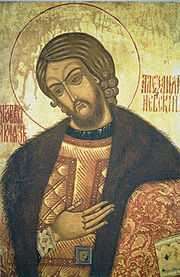Outline of Russia
_-_Crimea_disputed.svg.png)

The following outline is provided as an overview of and topical guide to Russia.
The Russian Federation, commonly known as Russia, is the most extensive country in the world, covering 17,075,400 square kilometres (6,592,800 sq mi), more than an eighth of the Earth’s land area.[1] Russia is a transcontinental country extending across the whole of northern Asia and 40% of Europe; it spans 11 time zones and incorporates a great range of environments and landforms. With 143 million people, Russia is the eighth most populated country. Russia has the world's largest mineral and energy resources, has the world's largest forest reserves, and its lakes contain approximately one-quarter of the Earth's fresh liquid water.
General reference

- Pronunciation:
- Common English country name: Russia
- Official English country name: The Russian Federation
- Common endonym(s): Россия (Rossiya)
- Official endonym(s): Российская Федерация (Rossiyskaya Federatsiya)
- Adjectival(s): Russian
- Demonym(s):
- Etymology: Name of Russia
- International rankings of Russia
- ISO country codes: RU, RUS, 643
- ISO region codes: See ISO 3166-2:RU
- Internet country code top-level domain: .ru, .su and .рф
Geography of Russia

- Russia is: a country
- Location: transcontinental (lies in both Europe and Asia)
- Eastern Hemisphere
- Northern Hemisphere
- Time zones:
- Kaliningrad Time – UTC+03
- Moscow Time – UTC+04
- Samara Time – UTC+05
- Yekaterinburg Time – UTC+06
- Omsk Time – UTC+07
- Krasnoyarsk Time – UTC+08
- Irkutsk Time – UTC+09
- Yakutsk Time – UTC+10
- Vladivostok Time – UTC+11
- Magadan Time – UTC+12
- Kamchatka Time – UTC+13
- Extreme points of Russia
- High: Mount Elbrus 5,642 m (18,510 ft) – highest point in Europe
- Low: Caspian Sea −28 m (−92 ft) – lowest point in Europe
- Land boundaries: 20,242 km[2]
 Kazakhstan 6,846 km
Kazakhstan 6,846 km China 3,645 km
China 3,645 km Mongolia 3,441 km
Mongolia 3,441 km Ukraine 1,576 km
Ukraine 1,576 km Finland 1,313 km
Finland 1,313 km Belarus 959 km
Belarus 959 km Georgia 723 km, including:
Georgia 723 km, including:
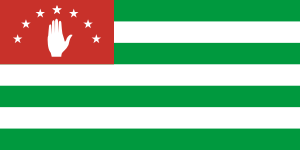 Abkhazia 255 km[2]
Abkhazia 255 km[2]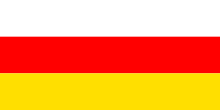 South Ossetia 70 km[2]
South Ossetia 70 km[2]
 Poland 432 km
Poland 432 km Latvia 292 km
Latvia 292 km Estonia 290 km
Estonia 290 km Azerbaijan 284 km
Azerbaijan 284 km Lithuania 227 km
Lithuania 227 km Norway 196 km
Norway 196 km North Korea 18 km
North Korea 18 km
- Coastline: 37,653 km[3]
- Population of Russia: 142,942,000 people (2010 census) – 8th most populous country
- Area of Russia: 17,075,400 km2 (6,592,800 sq mi) – 1st largest country
- Atlas of Russia
Environment of Russia

- Climate of Russia
- Environmental issues in Russia
- Ecoregions in Russia
- Renewable energy in Russia
- Geology of Russia
- National parks of Russia
- Protected areas of Russia
- Wildlife of Russia
- Fauna of Russia
Geographic features of Russia
- Glaciers of Russia
- Islands of Russia
- Lakes of Russia
- Caspian Sea (lake with 1.3% salinity, about a third the salinity of seawater. Compare with Great Salt Lake.)
- Mountains of Russia
- Plains of Russia
- Rivers of Russia
- Waterfalls of Russia
- Valleys of Russia
- World Heritage Sites in Russia
Regions of Russia
Ecoregions of Russia
Subdivisions of Russia
Republics of Russia
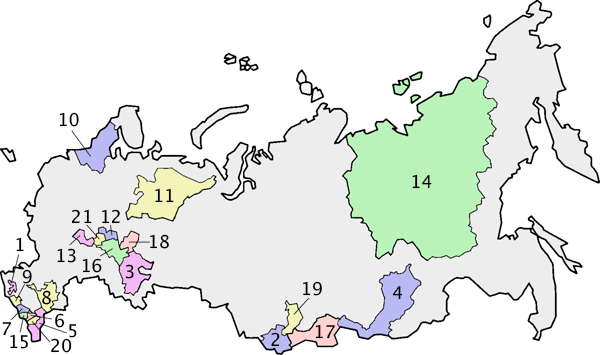 | ||
|
8. Republic of Kalmykia |
15. Republic of North Ossetia–Alania |
Oblasts of Russia
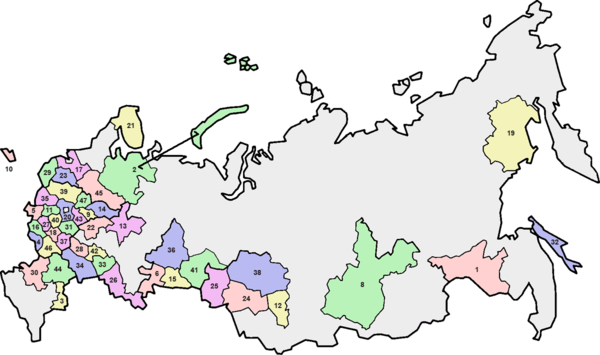
|
1. Amur Oblast |
11. Kaluga Oblast |
21. Murmansk Oblast |
31. Ryazan Oblast |
41. Tyumen Oblast |
Krais of Russia

Autonomous oblasts of Russia

Autonomous okrugs of Russia

|
1. Chukotka Autonomous Okrug |
Federal cities of Russia

Municipalities of Russia
Demographics of Russia
Government and politics of Russia
Russia has made its choice in favor of democracy. Fourteen years ago, independently, without any pressure from outside, it made that decision in the interests of itself and interests of its people — of its citizens. This is our final choice, and we have no way back. There can be no return to what we used to have before. And the guarantee for this is the choice of the Russian people, themselves. No, guarantees from outside cannot be provided. This is impossible. It would be impossible for Russia today. Any kind of turn towards totalitarianism for Russia would be impossible, due to the condition of the Russian society.
- Main article: Government of Russia and Politics of Russia
- Form of government: federal presidential republic
- Capital of Russia: Moscow
- Elections in Russia
- Political parties in Russia
- Taxation in Russia
Branches of the government of Russia
Executive branch of the government of Russia
- Head of state: President of Russia, Vladimir Putin
- State Council of the Russian Federation (advisory board to the Head of State)
- Presidential Administration of Russia (President's support staff)
- Head of government: Prime Minister of Russia, Dmitry Medvedev
- Public Chamber of Russia
- 17 Ministries
- 7 Federal Services
- 30+ Federal Agencies
Legislative branch of the government of Russia
- Federal Assembly of Russia (bicameral parliament)
- Upper house: Federation Council of Russia
- Lower house: State Duma
Judicial branch of the government of Russia
- Constitutional Court of the Russian Federation
- Supreme Court of Russia
Foreign relations of Russia
- Diplomatic missions of Russia
- Diplomatic missions in Russia
International organization membership
The Russian Federation is a member of:[1]
Law and order in Russia
- Main article: Law of Russia
- Capital punishment in Russia
- Constitution of Russia
- Crime in Russia
- Human rights in Russia
- Law enforcement in Russia
- Media freedom in Russia
Military of Russia
- Main article: Military of Russia
- Command
- Forces
- Army of Russia
- Navy of Russia
- Russian Air Force
- Special forces of Russia (Spetsnaz)
- Military history of Russia
- Military ranks of Russia
History of Russia
- Main articles: History of Russia, Timeline of Russian history, and Current events of Russia
History of Russia, by period
- Ancient Russia
- Early East Slavs
- East Slavs
- Rus' Khaganate
- Kievan Rus'
- Mongol invasion of Rus
- Tatar invasions
- Volga Bulgaria
- Golden Horde
- Grand Duchy of Moscow
- Tsardom of Russia
- Russian Empire
- French invasion of Russia
- World War I
- Russian Revolution of 1917
- Russian Civil War
- History of the Soviet Union
- Russian SFSR
- Soviet Union
- Soviet Union in World War II
- Cold War
- Soviet war in Afghanistan
- Dissolution of the Soviet Union
- Russian Federation
History of Russia, by Region
Republics
- History of Adygea
- History of the Altai Republic
- History of Bashkortostan
- History of Buryatia
- History of Chechnya
- History of Chuvashia
- History of Dagestan
- History of Ingushetia
- History of Kabardino-Balkaria
- History of Kalmykia
- History of Karachay-Cherkessia
- History of the Republic of Karelia
- History of Khakassia
- History of the Komi Republic
- History of Mari El
- History of Mordovia
- History of North Ossetia–Alania
- History of the Sakha Republic
- History of Tatarstan
- History of Tuva
- History of Udmurtia
Krais
- History of Altai Krai
- History of Kamchatka Krai
- History of Khabarovsk Krai
- History of Krasnodar Krai
- History of Krasnoyarsk Krai
- History of Perm Krai
- History of Primorsky Krai
- History of Stavropol Krai
- History of Zabaykalsky Krai
Oblasts
- History of Amur Oblast
- History of Arkhangelsk Oblast
- History of Astrakhan Oblast
- History of Belgorod Oblast
- History of Bryansk Oblast
- History of Chelyabinsk Oblast
- History of Irkutsk Oblast
- History of Ivanovo Oblast
- History of Kaliningrad Oblast
- History of Kaluga Oblast
- History of Kemerovo Oblast
- History of Kirov Oblast
- History of Kostroma Oblast
- History of Kurgan Oblast
- History of Kursk Oblast
- History of Leningrad Oblast
- History of Lipetsk Oblast
- History of Magadan Oblast
- History of Moscow Oblast
- History of Murmansk Oblast
- History of Nizhny Novgorod Oblast
- History of Novgorod Oblast
- History of Novosibirsk Oblast
- History of Omsk Oblast
- History of Orenburg Oblast
- History of Oryol Oblast
- History of Penza Oblast
- History of Pskov Oblast
- History of Rostov Oblast
- History of Ryazan Oblast
- History of Sakhalin Oblast
- History of Samara Oblast
- History of Saratov Oblast
- History of Smolensk Oblast
- History of Sverdlovsk Oblast
- History of Tambov Oblast
- History of Tomsk Oblast
- History of Tula Oblast
- History of Tver Oblast
- History of Tyumen Oblast
- History of Ulyanovsk Oblast
- History of Vladimir Oblast
- History of Volgograd Oblast
- History of Vologda Oblast
- History of Voronezh Oblast
- History of Yaroslavl Oblast
Federal cities
History of Russia, by subject
- History of Russian culture
- Economic history of the Russian Federation
- Film history of Russia
- History of innovation in Russia
- History of the Jews in Russia
- History of the Russian language
- Military history of Russia
- Postage stamps and postal history of Russia
Culture of Russia
.jpg)
- Main article: Russian culture and Russians
- Architecture of Russia
- Cuisine of Russia
- Festivals in Russia
- Humor in Russia
- Languages of Russia
- Material culture in Russia
- Media in Russia
- Museums in Russia
- National symbols of Russia
- Coat of arms of Russia
- Flag of Russia
- List of Russian flags
- National anthem of Russia
- People of Russia
- Famous Russians
- Prostitution in Russia
- Public holidays in Russia
- Records of Russia
- Religion in Russia
- Buddhism in Russia
- Christianity in Russia
- Hinduism in Russia
- Islam in Russia
- Judaism in Russia
- Sikhism in Russia
- Russian folklore
- Russian martial arts
- World Heritage Sites in Russia
Art in Russia
|
|
Sports in Russia
- Main article: Sports in Russia
Economy and infrastructure of Russia

- Main article: Economy of Russia
- Economic rank, by nominal GDP (2008): 8th (eighth)
- Agriculture in Russia
- Banking in Russia
- Communications in Russia
- Companies of Russia
- Currency of Russia: Ruble
- Defense industry of Russia
- Economic history of Russia
- Energy in Russia
- Energy policy of Russia
- Oil industry in Russia
- Health care in Russia
- Mining in Russia
- Russia Stock Exchange
- Tourism in Russia
- Transport in Russia
- Airports in Russia
- Rail transport in Russia
- Roads in Russia
- Water supply and sanitation in Russia
Education in Russia
- Main article: Education in Russia
See also
- Index of Russia-related articles
- List of international rankings
- Member state of the Group of Twenty Finance Ministers and Central Bank Governors
- Member state of the United Nations
- Outline of Asia
- Outline of Europe
- Outline of geography
References
- ↑ 1.0 1.1 "Russia". The World Factbook. United States Central Intelligence Agency. July 2, 2009. Retrieved July 23, 2009.
- ↑ 2.0 2.1 2.2 Russia recognizes Abkhazia and South Ossetia as independent states, thus bordering in total 16 countries, more than any other country. If only widely recognized states counted, Russia ties with China, each bordering 14 countries.
- ↑ Russia also borders the Caspian Sea, a remnant of the ancient Paratethys Sea.
External links
| Russian language edition of Wikipedia, the free encyclopedia |
- Interfax.com—News agency based in Moscow
- Russia Profile English-language information service
- RussGUS Bibliographic database of German publications on Russia (about 175 000 positions)
- Government resources
- Russian News Agency Ria Novosti
- Duma—Official site of the parliamentary lower house (Russian)
- Federative Council—Official site of the parliamentary upper house
- Kremlin—Official presidential site
- Gov.ru—Official governmental portal (Russian)
- Russian Federation Today—Official issue of the Federal Assembly (Russian)
- Ministry of Foreign affairs
- Russian Federal Customs Service
- Central Bank of Russia
| ||||||
| ||||||||||||||||||||||||




